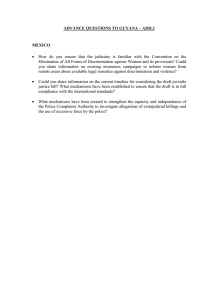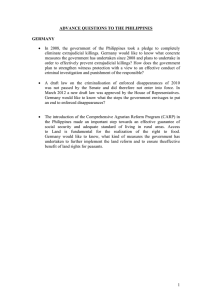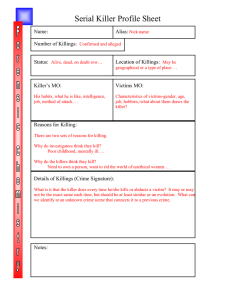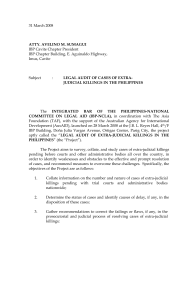Uploaded by
kenneth aspiras
Extrajudicial Killings in the Philippines: Ethical Analysis
advertisement
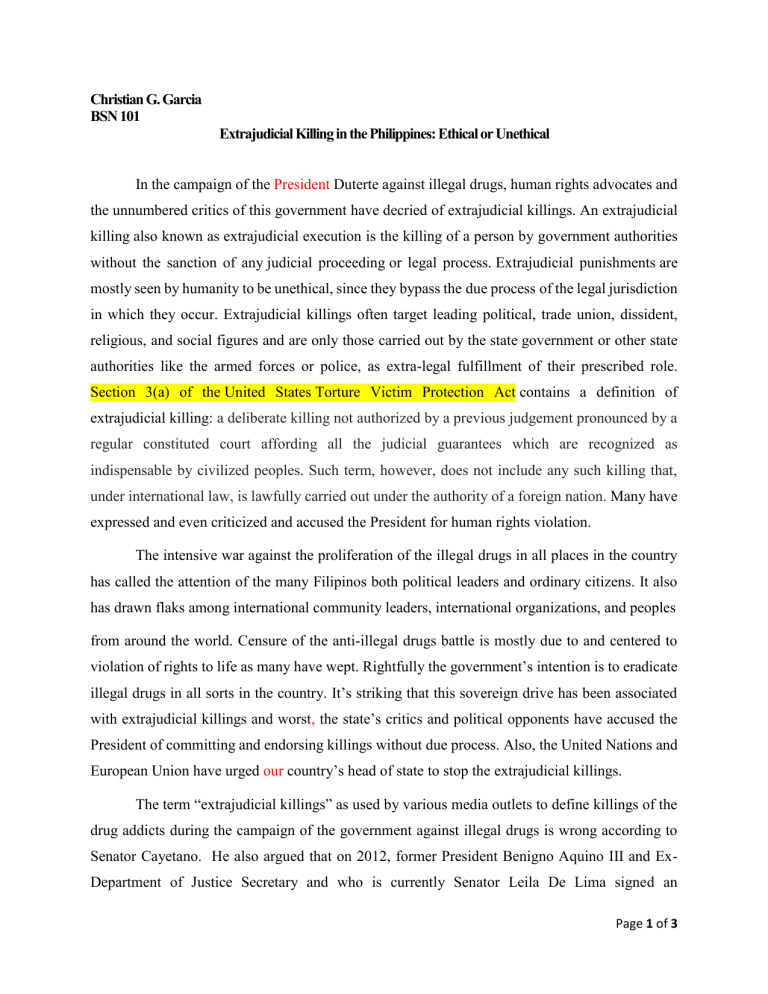
Christian G. Garcia BSN 101 Extrajudicial Killing in the Philippines: Ethical or Unethical In the campaign of the President Duterte against illegal drugs, human rights advocates and the unnumbered critics of this government have decried of extrajudicial killings. An extrajudicial killing also known as extrajudicial execution is the killing of a person by government authorities without the sanction of any judicial proceeding or legal process. Extrajudicial punishments are mostly seen by humanity to be unethical, since they bypass the due process of the legal jurisdiction in which they occur. Extrajudicial killings often target leading political, trade union, dissident, religious, and social figures and are only those carried out by the state government or other state authorities like the armed forces or police, as extra-legal fulfillment of their prescribed role. Section 3(a) of the United States Torture Victim Protection Act contains a definition of extrajudicial killing: a deliberate killing not authorized by a previous judgement pronounced by a regular constituted court affording all the judicial guarantees which are recognized as indispensable by civilized peoples. Such term, however, does not include any such killing that, under international law, is lawfully carried out under the authority of a foreign nation. Many have expressed and even criticized and accused the President for human rights violation. The intensive war against the proliferation of the illegal drugs in all places in the country has called the attention of the many Filipinos both political leaders and ordinary citizens. It also has drawn flaks among international community leaders, international organizations, and peoples from around the world. Censure of the anti-illegal drugs battle is mostly due to and centered to violation of rights to life as many have wept. Rightfully the government’s intention is to eradicate illegal drugs in all sorts in the country. It’s striking that this sovereign drive has been associated with extrajudicial killings and worst, the state’s critics and political opponents have accused the President of committing and endorsing killings without due process. Also, the United Nations and European Union have urged our country’s head of state to stop the extrajudicial killings. The term “extrajudicial killings” as used by various media outlets to define killings of the drug addicts during the campaign of the government against illegal drugs is wrong according to Senator Cayetano. He also argued that on 2012, former President Benigno Aquino III and ExDepartment of Justice Secretary and who is currently Senator Leila De Lima signed an Page 1 of 3 administrative order to know when the term “extrajudicial killings” can be used. In such Administrative Order No.35, extra-legal killings (ELK) or extra-judicial killings (EJK)- for purposes of operationalization and implementation of this Administrative Order No.35, the ELK/EJK will refer to killings wherein, the victim was a member of, or affiliated with an organization, to include political, environmental, agrarian, labor, or similar causes; or an advocate of above-named causes; a media practitioner; or person(s) apparently mistaken or identified to be so. Historically, Christian Pangilinan (2012) wrote that extrajudicial killings and other human rights violations have existed long years ago since the administration of President Ferdinand Marcos and after his implementation of Martial Law. A TOTAL of 3,257 extrajudicial killings (EJKs) were committed during the Marcos dictatorship. In contrast, there were 805 drug-related fatalities from May 10 (when Rodrigo Duterte emerged winner of the presidential election) to Aug. 12, per the Inquirer count. If the current rate continues, the total number of EJKs for the six years of the Duterte administration will end up about 700 percent more than the killings committed during the 14 years of the Marcos dictatorship. President Duterte is either ill-advised or terribly underestimating the risk that he can be held liable at the International Criminal Court, given the circumstances of the killings. Killings are act of human rights violations. Nobody is authorized to take away life from any person. Everyone has the right to live. In the war against illegal drugs the conflict between human rights advocates and political partisans has arisen. It is right to claim that even criminals have right to live. But, what about their victims? Isn’t right to also say that the innocent victims of drug reprobates have the right to free existence and breath? The Commission on Human Rights and the United Nations have urged the government to stop the violence and killing. Human rights violation in any way is not acceptable. Whatever will be the reason for killing will never be valid. The right to live is fundamentally basic and is not to be breached. In the determination of the government to stop illegal drugs, the phrase “extrajudicial killings” have gone controversial locally and internationally. There is no extrajudicial killing in the country nor has the government sponsored such killings. However, there are only killings for many decades now but the government is not behind it. And illegal drugs problem have persisted and have caused many victims and the country too much problems. It has to be solved. Page 2 of 3 Is the situation really improving? Does it help our society to lessen crimes and the use of illegal drugs?. No It doesn’t lessen the drug addicts and the users of illegal drugs but increases the number of deaths of innocent people who are accused but the evidence is not enough to kill one’s life. There is a proper way of giving a judgement, it can be done through the court and its a long process, therefore it can be prove if that person used or involved in that certain crime. The use of the term “extrajudicial killings” in deaths due to legitimate drug operations should be dropped and stopped. Likewise, associating the numbered deaths to the government’s campaign to end illegal drugs is unfair to the many law-enforcers who have rendered and risks their lives and has to be eluded. A more appropriate term shall be used to address anti-drug related deaths. SUGGESTIONS. You can also add tito Ian na the war on drugs seems to focus on the poor, on the small time drug pushers, wherein the drug on war should start on the producers. Na the campaign of the government if it will be compared to a tree, focuses on the leaves and the branches wherein the campaign should focus on the roots. Use the Oplan Tokhang word and Tokhang na word because it make sense na kapag narinig mo yung tokhang may negative connotation. Kulang yung effect. I see the effect na madaming namamatay and their rights to live was breached, but thats just the surface of the effects, try to broaden. For example, this campaign somehow constitutes fear and the Idea that you can kill someone and runaway from the law Solution? Parang wala yung solution paps. Di masyadong kita. You should give the solution, yes we should bring back the peace and order but how? Tapos make it atleast 1 paragraph before your closing statement. You can give effects on each levels, ano ba yung effect into sa micro, meso and macro levels ng society? Make an opening statement, thesis staement kumbaga. Para kaseng may dapat na mauuna don sa first paragraph. Tapos medyo long paragraphs. Katulad yung first paragraph, you can divide that into two, kase wala lang. Hahahaha. Pero mas masarap basahin kase kapag di masyadong mahahaba paragraphs, okay lang kung medyo maiikli. Page 3 of 3
